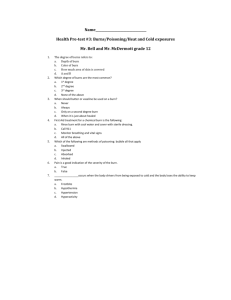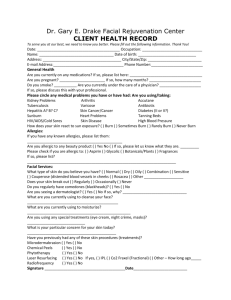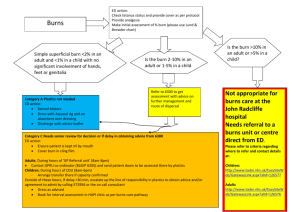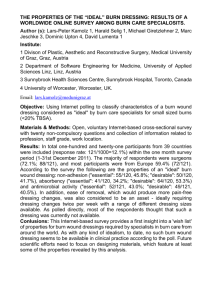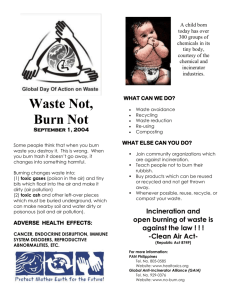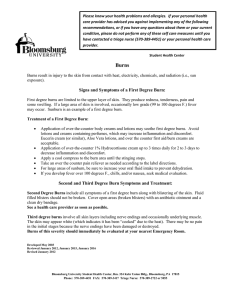INSTRUCTION SHEET: BURNS University of North Carolina Wilmington Abrons Student Health Center
advertisement
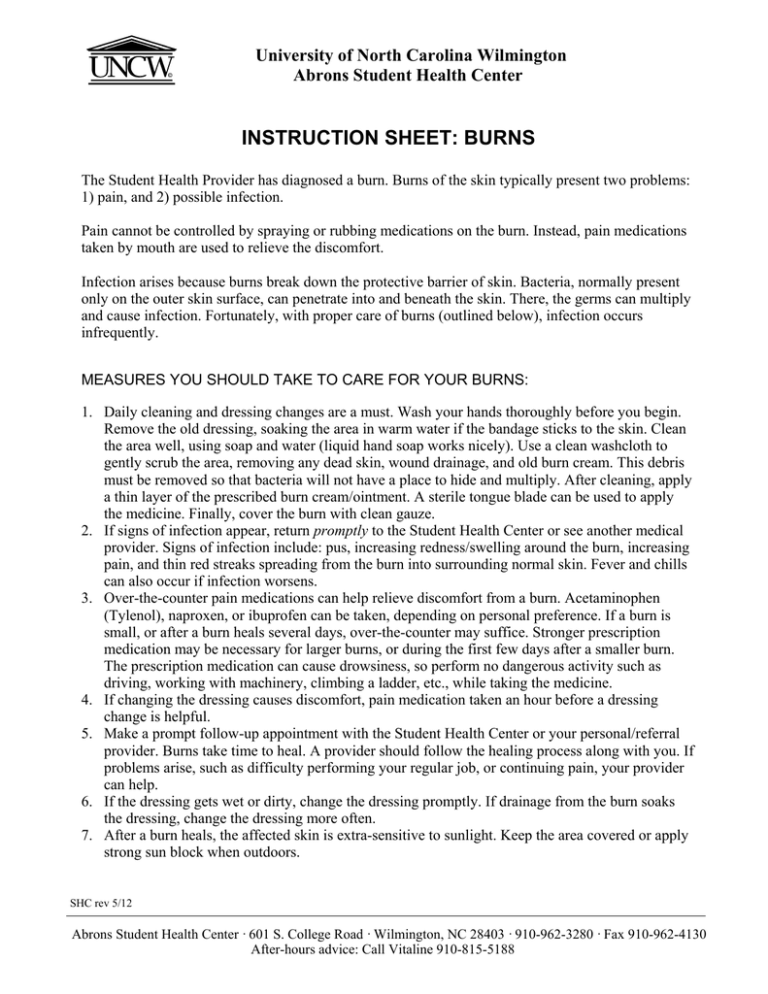
University of North Carolina Wilmington Abrons Student Health Center INSTRUCTION SHEET: BURNS The Student Health Provider has diagnosed a burn. Burns of the skin typically present two problems: 1) pain, and 2) possible infection. Pain cannot be controlled by spraying or rubbing medications on the burn. Instead, pain medications taken by mouth are used to relieve the discomfort. Infection arises because burns break down the protective barrier of skin. Bacteria, normally present only on the outer skin surface, can penetrate into and beneath the skin. There, the germs can multiply and cause infection. Fortunately, with proper care of burns (outlined below), infection occurs infrequently. MEASURES YOU SHOULD TAKE TO CARE FOR YOUR BURNS: 1. Daily cleaning and dressing changes are a must. Wash your hands thoroughly before you begin. Remove the old dressing, soaking the area in warm water if the bandage sticks to the skin. Clean the area well, using soap and water (liquid hand soap works nicely). Use a clean washcloth to gently scrub the area, removing any dead skin, wound drainage, and old burn cream. This debris must be removed so that bacteria will not have a place to hide and multiply. After cleaning, apply a thin layer of the prescribed burn cream/ointment. A sterile tongue blade can be used to apply the medicine. Finally, cover the burn with clean gauze. 2. If signs of infection appear, return promptly to the Student Health Center or see another medical provider. Signs of infection include: pus, increasing redness/swelling around the burn, increasing pain, and thin red streaks spreading from the burn into surrounding normal skin. Fever and chills can also occur if infection worsens. 3. Over-the-counter pain medications can help relieve discomfort from a burn. Acetaminophen (Tylenol), naproxen, or ibuprofen can be taken, depending on personal preference. If a burn is small, or after a burn heals several days, over-the-counter may suffice. Stronger prescription medication may be necessary for larger burns, or during the first few days after a smaller burn. The prescription medication can cause drowsiness, so perform no dangerous activity such as driving, working with machinery, climbing a ladder, etc., while taking the medicine. 4. If changing the dressing causes discomfort, pain medication taken an hour before a dressing change is helpful. 5. Make a prompt follow-up appointment with the Student Health Center or your personal/referral provider. Burns take time to heal. A provider should follow the healing process along with you. If problems arise, such as difficulty performing your regular job, or continuing pain, your provider can help. 6. If the dressing gets wet or dirty, change the dressing promptly. If drainage from the burn soaks the dressing, change the dressing more often. 7. After a burn heals, the affected skin is extra-sensitive to sunlight. Keep the area covered or apply strong sun block when outdoors. SHC rev 5/12 Abrons Student Health Center · 601 S. College Road · Wilmington, NC 28403 · 910-962-3280 · Fax 910-962-4130 After-hours advice: Call Vitaline 910-815-5188
